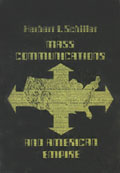
| Home News Releases | Calendar Contact |
Sources Bookshelf

Mass Communications and American Empire
Schiller, Herbert I.
Publisher: Beacon Press, Boston, USAYear Published: 1971
Pages: 170pp ISBN: 0-8070-6175-1
Please see our media profile in Sources:
Sources Select Resources
This book is an in-depth look at international and domestic media, and the effect of capitalism on mass communications. Schiller analyzes the direction of global communication. The power of competitive, free enterprise in the communications sector is discussed, as well as the possibility of a more democratic system of media. The book aims to bring about more understanding regarding the evolution of the media.
The chapters are essentially essays. They are organized logically to introduce the topic, take a more detailed look at Schiller's scholarly research, and conclude with his viewpoint on a possible media reformation. The entire work is critical and resourceful. Schiller's allegations are supported by facts from industrial and government sources, and many tables give numbers as evidence. The focus of the first few chapters is the development of the media in the United States, from the radio to the television. There are essays that analyze government involvement and private interest in the information that is presented to the public, and a few that describe the impact the U.S. government has had on international affairs through their "electronic invasion". The conclusion is that the media should fulfil education and information needs. While following the American model, it should be not only a powerful industry, but also a means of communicating a variety of different perspectives.
"Antiquated and narrow perspectives and structures at home and abroad are choking human potential." The media conglomerates are reducing the variety of opinions expressed to the public and controlling what news is presented. Schiller acknowledges the benefits of the American, capitalist form of mass communications, but also looks critically at the consequences of such a system. Changes must be made to preserve freedom of the press.
[Abstract by Mia Manns]
Subject Headings
- Africa
- Broadcasting
- Broadcasting Industry
- Commercialization
- Communications
- Communications Industry
- Communications Studies
- Crisis Management
- Cultural Imperialism
- Developing Countries
- Educational Broadcasting
- Educational Television
- Film History
- Film Industry
- Mass Communication Studies
- Mass Communications
- Militarization
- Motion Picture Industry
- Radio
- Radio History
- Television
- U.S. Imperialism
© Sources 2023. The information provided is copyright and may not be reproduced in any form or by any means (whether electronic, mechanical or photographic), or stored in an electronic retrieval system, without written permission of the publisher.